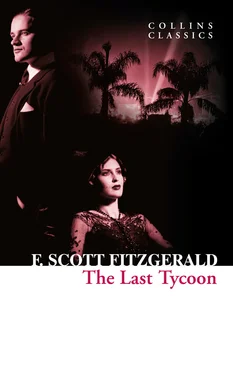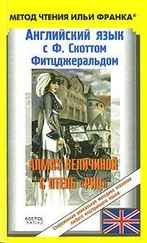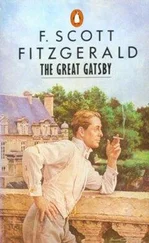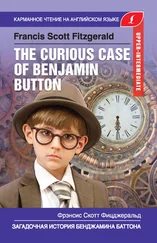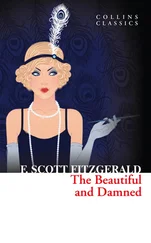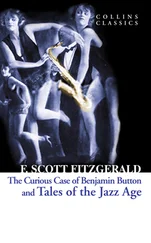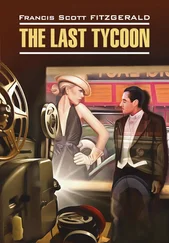She and Wylie waited in silence—occasionally addressing a remark to Miss Doolan. Every few minutes Reinmund, the supervisor, called up from his office, where he and Broaca, the director, were waiting. After ten minutes Stahr’s button went on, and Miss Doolan called Reinmund and Broaca; simultaneously. Stahr and the actor came out of Stahr’s office with Stahr holding the man’s arm. He was so wound up now that when Wylie White asked him how he was he opened his mouth and began to tell him then and there.
“Oh, I’ve had an awful time,” he said, but Stahr interrupted sharply.
“No, you haven’t. Now you go along and do the role the way I said.”
“Thank you, Monroe.”
Jane Meloney looked after him without speaking.
“Somebody been catching flies on him?” she asked—a phrase for stealing scenes.
“I’m sorry I kept you waiting,” Stahr said. “Come on in.”
It was noon already and the conferees were entitled to exactly an hour of Stahr’s time. No less, for such a conference could only be interrupted by a director who was held up in his shooting; seldom much more, because every eight days the company must release a production as complex and costly as Reinhardt’s Miracle.
Occasionally, less often than five years ago, Stahr would work all through the night on a single picture. But after such a spree he felt badly for days. If he could go from problem to problem, there was a certain rebirth of vitality with each change. And like those sleepers who can wake whenever they wish, he had set his psychological clock to run one hour.
The cast assembled included, besides the writers, Reinmund, one of the most favored of the supervisors, and John Broaca, the picture’s director.
Broaca, on the surface, was all engineer—large and without nerves, quietly resolute, popular. He was an ignoramus, and Stahr often caught him making the same scenes over and over—one scene about a rich young girl occurred in all his pictures with the same action, the same business. A bunch of large dogs entered the room and jumped around the girl. Later the girl went to a stable and slapped a horse on the rump. The explanation was probably not Freudian; more likely that at a drab moment in youth he had looked through a fence and seen a beautiful girl with dogs and horses. As a trademark for glamor it was stamped on his brain forever.
Reinmund was a handsome young opportunist, with a fairly good education. Originally a man of some character, he was being daily forced by his anomalous position into devious ways of acting and thinking. He was a bad man now, as men go. At thirty he had none of the virtues which either gentile Americans or Jews are taught to think admirable. But he got his pictures out in time, and by manifesting an almost homosexual fixation on Stahr, seemed to have dulled Stahr’s usual acuteness. Stahr liked him—considered him a good all-around man.
Wylie White, of course, in any country would have been recognizable as an intellectual of the second order. He was civilized and voluble, both simple and acute, half dazed and half saturnine. His jealousy of Stahr showed only in unguarded flashes, and was mingled with admiration and even affection.
“The production date for this picture is two weeks from Saturday,” said Stahr. “I think basically it’s all right—much improved.”
Reinmund and the two writers exchanged a glance of congratulation.
“Except for one thing,” said Stahr, thoughtfully. “I don’t see why it should be produced at all, and I’ve decided to put it away.”
There was a moment of shocked silence—and then murmurs of protest, stricken queries.
“It’s not your fault,” Stahr said. “I thought there was something there that wasn’t there—that was all.” He hesitated, looking regretfully at Reinmund: “It’s too bad—it was a good play. We paid fifty thousand for it.”
“What’s the matter with it, Monroe?” asked Broaca bluntly.
“Well, it hardly seems worthwhile to go into it,” said Stahr. Reinmund and Wylie White were both thinking of the professional effect on them. Reinmund had two pictures to his account this year—but Wylie White needed a credit to start his comeback to the scene. Jane Meloney was watching Stahr closely from little skull-like eyes.
“Couldn’t you give us some clue,” Reinmund asked. “This is a good deal of a blow, Monroe.”
“I just wouldn’t put Margaret Sullavan in it,” said Stahr. “Or Colman either. I wouldn’t advise them to play it—”
“Specifically, Monroe,” begged Wylie White. “What didn’t you like? The scenes? The dialogue? The humor? Construction?”
Stahr picked up the script from his desk, let it fall as if it were, physically, too heavy to handle.
Конец ознакомительного фрагмента.
Текст предоставлен ООО «ЛитРес».
Прочитайте эту книгу целиком, купив полную легальную версию на ЛитРес.
Безопасно оплатить книгу можно банковской картой Visa, MasterCard, Maestro, со счета мобильного телефона, с платежного терминала, в салоне МТС или Связной, через PayPal, WebMoney, Яндекс.Деньги, QIWI Кошелек, бонусными картами или другим удобным Вам способом.
